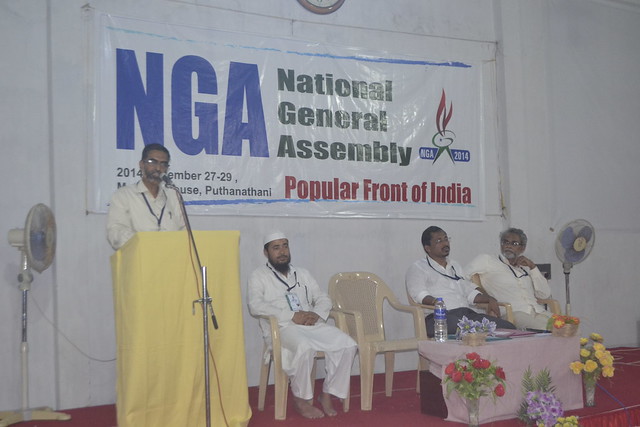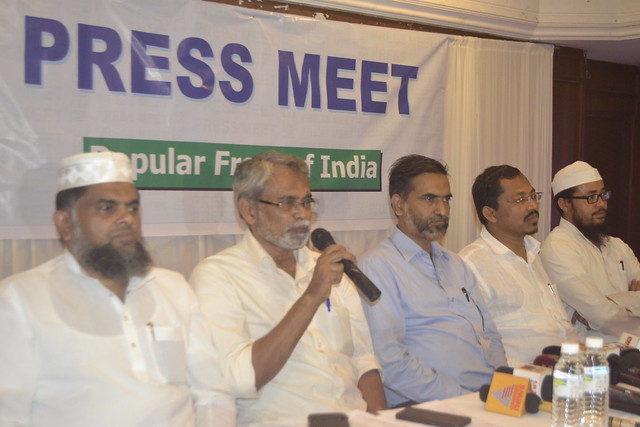By TCN News,
Calicut (Kerala): K M Shareef (Karnataka) was elected as the new chairman, E M Abdul Rahiman (Kerala) as vice chairman, M Muhammad Ali Jinnah (Tamil Nadu) as general secretary and Muhammad Khalid (Manipur) was elected as the new treasurer of the Popular Front of India at its national general assembly.
Among the resolutions it passed, one titled ‘Muslim politics should change for better’, said it is high time that Muslim political parties gave up their narrow agenda and worked for a viable political platform for the Muslims.

The assembly was held at the Malabar House, Puthanathani in Malappuram district on December 27, 28 and 29. Apart from the election of the national executive council members, the assembly also elected the national functionaries for the next two year term, a release said here.
The members of the new national executive council are as follows: O M Abdul Salam, C Abdul Samad, M Abdul Samad, Abdul Vahid Sait, Ashraf Moulavi Karamana, Hamid Muhammad, Muhammad Roshan and Adv Muhammad Yusuf.
The Assembly started with the introductory speech by the chairman K M Shareef. The annual report was presented by the General Secretary O M A Salam. The members reviewed the report and submitted suggestions for the next term.
Report summary:
The organisation has around 80,000 cadres along with more than three lakh associates. In addition to 11 states where the organisation has full-fledged network, it has registered expansion and growth in another seven states, the release said.
In 2014, the Popular Front had intervened in different social, political and international issues and held a nationwide campaign demanding the repeal of the draconian law UAPA, it said. The PFI also took steps to build a broad-based alliance of different minority and civil rights leaders and groups against growing authoritarian and communal tendencies, the release said, adding, “The national movement against UAPA, the Sikh-Muslim mission for communal harmony, the joint platform that has commemorated anti-Sikh riot of 1984 and Babri Masjid demolition of 1992 are a few among such steps.”
In the context of Israel’s attack on people of Gaza, Popular Front held nation-wide solidarity campaign captioned ‘I am Gaza’. In the community development and social welfare areas, the organisation had undertaken the School Chalo campaign cum service programmes wherein78,889 school kits were distributed in 16 states at a cost of Rs 2,54,59,116. Another Rs 94,17,802 was spent for scholarships which benefitted 2047 students, the party report said.

Resolutions:
A set of resolutions pertaining to various social and political issues were adopted after discussions. The primary resolutions passed by the Assembly included: ‘Defeat the forces that attack the constitutional values’ (where a situation demands swift activism by the Muslims, Dalits, Backward classes and progressive movements and a united stand to fight the onslaught of fascism); ‘Discontent about the functioning of NDA government’ (where the PFI expressed its discontent at the economic and social policies of the NDA government led by Prime Minister Narendra Modi); ‘Welcomes Unification of Secular Parties’ (where old socialist forces spread over separate fractions of Janata family are coming together to make a common political platform. The PFI urged rather than going on a single agenda, it called for a concerted effort with clear political vision and comprehensive plan to alleviate the sufferings of the down-trodden, Dalits and minorities in India and to restore the weakened secular system to its formal health. It also warned that there was a need for deep rooted political move, rather than making it an exchange house of seats and emphasized the importance of taking in to confidence Muslims and other religious minorities, Adivasis, Dalits and other deprived communities); ‘Muslim politics should change for better’ (As the rise of Hindutva politics has complicated the problems of Muslims, instead of focusing on vote bank politics, the Muslim political parties should come forward to address Muslim issues at large); ‘Politics of Black Money’; ‘Stop the atrocities on women’ and ‘Neo-Colonialism – A major threat to global stability and peace’.
Moulana Usman Baig, Prof P Koya and Anis Ahmed addressed different sessions. Around 200 delegates from 11 states participated in the assembly. The programme concluded with addresses by relieving general secretary O M A Salam and re-elected chairman K M Shareef. The programme director Adv Muhammad Yusuf proposed the vote of thanks.

